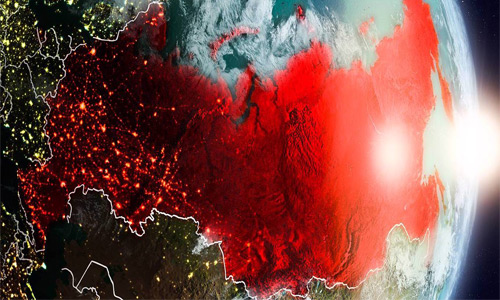While the European Union gears up for new leadership this fall, and while US President Donald Trump has just launched his 2020 re-election campaign, Russian President Vladimir Putin is sitting steady in the saddle with a mandate stretching to 2024. But what, exactly, does Putin intend to do with his next five years in the Kremlin?
Like leaders of all major powers, Russia’s elite must regularly try to divine the future, in order to shape the country’s strategic priorities in a way that anticipates likely challenges. The United States conducts such assessments every four years under the direction of the National Intelligence Council; the EU does so every five years, and has just published a semi-independent study of likely global trends between now and 2030.
In Russia’s case, geostrategic forecasting is one of the activities of the semi-official Primakov Institute of World Economy and International Relations (IMEMO), which has published a global outlook for 2035. Generally speaking, its assessment of future trends is similar to that of the US and the EU. Where the report gets interesting is in its appraisal of the implications for Russia. The authors identify several strategic dilemmas the country will face.
For example, according to the report, Russia’s top priority is “preserving and improving its position in the world hierarchy of powers and responsibility.” But achieving that will require a “structural reconstruction of the Russian economy.” That is, without far-reaching economic reforms – or what the authors describe as “radical changes” – Russia’s international standing will almost certainly decline. The same point is made with great force in Anders Åslund’s acclaimed book Russia’s Crony Capitalism.
Following the discussion of Russia’s economic plight, which is no small matter, the report addresses a number of complicated geostrategic issues. The authors expect an “inevitably long political conflict with the West in connection with Russia’s role in the post-Soviet space, first of all in defining the future of Ukraine and neighboring territories.” In the near term, they conclude that such tensions will make it necessary for Russia to turn to China and the East.
The implication is that the authors see no possible resolution to the conflicts that Russia has created in its attempts to undermine its immediate neighbors’ sovereignty. The study simply takes for granted that the Kremlin will continue to pursue revanchist policies abroad, despite the obvious negative impact its aggressive behavior had on Russia’s international standing and domestic economy. It is as though Russia’s illegal incursions into Georgia and Ukraine are mere historical matters, admitting of no solution in the present.
As for moving closer to China, this has been a hallmark of the Kremlin’s foreign policy at least since Russia’s annexation of Crimea in March 2014 provoked Western sanctions. Already this year, Putin has paid a visit to Chinese President Xi Jinping in Beijing, and Xi has met with Putin in Moscow and St. Petersburg.
The problem, as the IMEMO study shows, is that pursuing closer cooperation with China is not really a viable option for ensuring Russia’s long-term development. “In the long run,” the authors point out, “cooperation with China and other Asia-Pacific countries cannot become a strategic alternative to cooperation with the West.” Accordingly, the authors believe the Kremlin should be directing its efforts toward “working out its own agenda for possible active cooperation with” Europe and the US.
The upshot, then, is that Russia has not only failed to modernize as it should; it has also enmeshed itself in regional conflicts that have precipitated a crisis with the powers upon which its own development depends. This has forced Russia to rely ever more on China, even though it knows that becoming a junior partner to its eastern neighbor is not a desirable way forward. One way or another, Russia must find a way to restore relations with the West. This cannot happen immediately, given that the conflict in Ukraine remains a live issue; but it must be on the long-term agenda.
The obvious solution to the dilemma – admit that the conflict with Ukraine was a huge strategic mistake, and seek an honest settlement – was probably beyond the mandate of a study like this.
The question, of course, is whether Putin himself takes IMEMO studies seriously, or even reads them at all. I sincerely doubt it. Most likely, shorter-term security assessments are what command his attention. Nonetheless, it is notable that a respected semi-official institution with strong support among influential members of the Russian elite has produced such a report. Though its language is often cautious and obscure, it is a clear critique of Putin’s entire approach to foreign policy.
Moreover, the IMEMO is absolutely correct: Russia has created a situation in which its global standing might well deteriorate. Continued conflicts with its neighbors at the expense of its relationship with the West will inevitably prevent it from pursuing economic modernization and development. And without a strong economic foundation, it will have no chance of securing a respectable “position in the world hierarchy of powers and responsibility” that Putin seems to find so important.
Home » Opinion » Russia’s Strategic Priorities, Viewed from Within
Russia’s Strategic Priorities, Viewed from Within
| Carl Bildt

